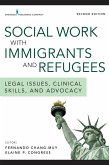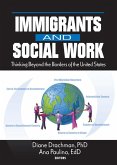Social work practice with refugees and immigrants requires specialized knowledge of these populations, and specialized adaptations and applications of mainstream services and interventions. Because they are often confronted with cultural, linguistic, political, and socioeconomic barriers, these groups are especially vulnerable to psychological problems. Among these problems are anxiety, depression, alienation, grief, even post-traumatic stress disorder, as well as biological concerns stemming from inadequate or underutilized medical services. Best Practices for Social Work with Refugees and Immigrants is the first book to offer a comprehensive guide to social work with foreign-born clients that evaluates many different strategies in light of their methodological strengths and weaknesses.
Part I sets forth the context for empirically based service approaches to such clients by describing the nature of these populations, relevant policies designed to assist them, and service delivery systems. Part II addresses specific problem areas common to refugees and immigrants and evaluates a variety of assessment and intervention techniques for each area. Maintaining a rigorous empirical and broadly pan-cultural approach throughout, Miriam Potocky-Tripodi seeks to identify the most practical, "best practices" to meet the various and pressing needs of uprooted peoples.
Part I sets forth the context for empirically based service approaches to such clients by describing the nature of these populations, relevant policies designed to assist them, and service delivery systems. Part II addresses specific problem areas common to refugees and immigrants and evaluates a variety of assessment and intervention techniques for each area. Maintaining a rigorous empirical and broadly pan-cultural approach throughout, Miriam Potocky-Tripodi seeks to identify the most practical, "best practices" to meet the various and pressing needs of uprooted peoples.
Dieser Download kann aus rechtlichen Gründen nur mit Rechnungsadresse in A, D ausgeliefert werden.









